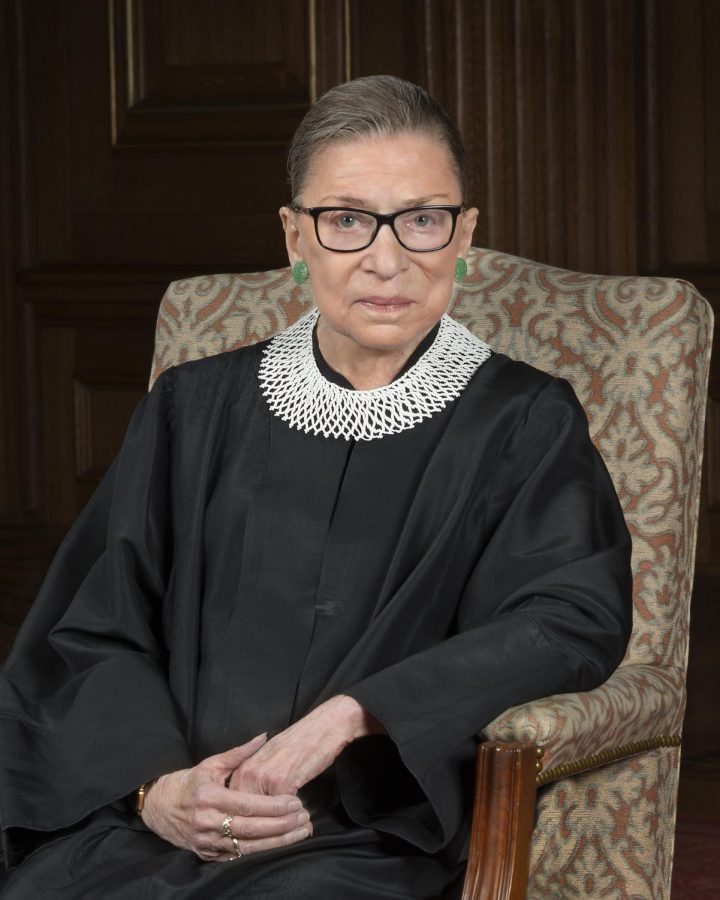RBG’s Death and the Divisive Fight to Fill her Seat
Feminist icon Justice Ruth Bader Ginsburg passed away recently, leaving an empty seat on the Supreme Court and what may be a contentious next few weeks as Republicans try to push through her successor.
Justice Ginsburg, 87, was the second woman ever appointed to the Supreme Court. With her struggles and achievements over the years, she became a feminist icon. The death, on September 18 of the often-called “Notorious RBG” means that the Supreme Court has now lost a liberal justice.
Justice Ginsburg died of metastatic pancreatic cancer. She had fought cancer three times before.
President Donald Trump is attempting to push a conservative justice, Amy Coney Barrett, in October, right before the November 3 election, opposing RBG’s wish before her death. If approved, Barrett will make the Supreme Court dominated by the right, which might undermine the causes RBG fought for, including gender equality. There are currently eight justices on the Supreme Court: three are liberal and five are conservative. Supreme Court justices are appointed for life.
RBG dedicated herself to eliminating the differences between men and women including at work, on the battlefield, and in the Supreme Court.
Williston students and faculty both reacted strongly to RBG’s death.
Because Ginsburg’s death came immediately tied in with who might succeed her, Ruby McElhone Yates, a senior and the leader of the Williston Democrats, has complicated, “layered” feelings about the death.
Ruby believes it is a pity that most of the attention is focused on the person who is going to replace RBG, not the famed Justice herself.
“Ruth Bader Ginsburg is such an inspiring figure from her time as a Supreme Court Justice and her time as a lawyer,” she said. “It is a shame that the attention has to go to filling her seat so soon, but admittedly that is one of the first things I thought of as well, because it does hold so much significance.”
Ruby is worried about and not satisfied with the current situation in the Supreme Court, because of how Republicans are trying to nominate another seat in an unethical way, rushing a justice in before the next election.
“I am really frustrated with the Senate Majority Leader [Mitch McConnell] and with Republicans who have stuck with the party and approved of nominating another justice,” she said. “Instead of with what I consider to be the ethical choice, considering the Supreme Court process in 2016.”
She is also afraid that important cases about human rights might be overturned. “I am also really scared,” she said. “A 6-3 conservative court could mean key human rights decisions like Obergefell v. Hodges and Roe v. Wade could be overturned and have a really lasting impact on the ability for historically marginalized groups in the U.S. to make progress and obtain their rights.”
Obergefell v. Hodges, in 2015, determined the protection of the fundamental right to marry for same-sex couples. Roe v. Wade, in 1973, made abortion legal.
As an active Democratic, Ruby is trying her best to do what she can.
“Now I am trying to put all of those feelings towards productive things,” she said, “Like electing Biden and Harris and flipping the senate, which I am lucky to be able to do with the Maine Democratic Party this trimester.”
As a Williston student, she also urges her fellow students and faculty members to keep on fighting for the cause of equality. “I really hope that all the students and faculty who posted a picture of RBG when she died will also do something to make sure her work isn’t undone,” she said.
She mentioned some specific methods that students could utilize.
“It could be phone banking, like what I do, or calling their senators, lobbying local representatives for the Roe act to be passed in Mass.,” she said. “Or any number of other things to make sure her life’s work wasn’t in vain, when a conservative court could undo the things she fought for.”
Amy Ren, a Williston junior from Jiangsu, China, said RBG’s death had a huge impact on her, especially in a country where feminism is still in its primary form and under furious debate.
“I think what RBG represents is the spirit that really speaks for women,” she said, “She used her own strength to testify, to support women, which is really brave and strong.”
Being a Williston student, she wants to use her power to influence people around her.
“Although I do not have as much charisma as her, I can study her ideas, and start from things around myself, helping women around me,” she said.
Kennedy Dawson, a junior day student at Williston, is sad at the death of this influential figure. “When I found out about RBG’s death,” she said, “I was heartbroken that someone who has had such a big impact on our society is gone. I feel scared about what her death now means for women and our rights in the future.”
Kennedy believes that this is an important moment in history. “I see RBG’s death as a tragic incident but one that will be the turning point of our justice system,” she said. “And it will become a defining moment for our society’s leaders.”
Frank Bruni, an opinion columnist, wrote in a New York Times article “The Special Hell of Trump’s Supreme Court Appointment” that Trump, having the chance to appoint three Justices, will make the situation worse if the next justice is approved before the November election. [Ed. note: At the time of Bruni’s article, Trump had not yet named Barrett as RBG’s replacement.]
“Trump, with his nonexistent mandate, reaches extra far and wreaks extra damage,” he said. “That’s what makes his reign so perverse. That’s the special hell of it.”
He believes that Trump is extra lucky in getting the chance to nominate three justices. “Yes, I know, some people — and some presidents — just get lucky. But no one gets luckier than Trump, and no one deserves it less,” he said.











